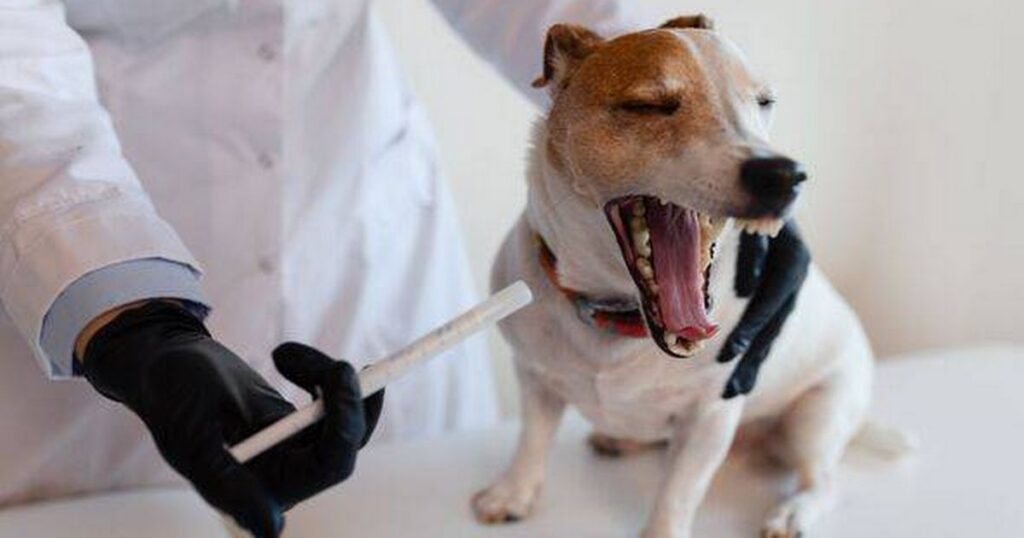Pet owners are being urged to monitor their dogs closely for symptoms as a highly contagious disease in canines is on the rise.
As the chill of winter descends upon us, it’s not just us humans who will feel the bite — our furry friends are also susceptible to the changing seasons.
Our beloved pets may start showing signs they’re feeling the seasonal change, particularly when it comes to their health. Dog owners are being urged to keep a close eye on their pooches as the shift in weather can have a significant impact on their wellbeing.
Cases of kennel cough are on the rise amongst dogs across the country, leading a senior vet to issue an urgent warning for pet owners to be vigilant for symptoms of this highly contagious disease.
Vets say the tell-tale signs of kennel cough, often referred to as ‘honking cough’, include a harsh, persistent, goose-like hacking sound that signals the infection. This highly infectious illness spreads rapidly in kennels, doggy daycares, and parks through airborne droplets, direct contact, and contaminated surfaces.
While healthy dogs might be able to fight off the condition, puppies, older dogs, and those with weakened immune systems can suffer more severe complications and remain infectious for longer periods, making quick identification crucial.
Veterinary experts recommend vaccinations, isolating affected dogs, and keeping communal areas clean. Minor infections usually clear up with plenty of rest and hydration, while more serious cases may need prescribed medication.
Daniella Dos Santos, Senior Vet at IVC Evidensia, and veterinarian Iryna Smyrnova in collaboration with Bubblegum Search, have offered vital advice on kennel cough. They cover everything from warning signs to look out for, when it’s time to see a vet, and likely treatment options for dogs affected by this condition.
What triggers kennel cough?
Kennel cough is primarily brought on by various bacteria and viruses, notably Bordetella bronchiseptica and the canine parainfluenza virus. These irritants impact a dog’s airways and can spread swiftly through the air, direct contact, or shared items like bowls, toys, and bedding. This quick transmission is why the disease spreads so rapidly in places like kennels, daycares, and shelters, Daniella explains.
Symptoms and indications of Kennel Cough
The cough linked with kennel cough is harsh, hacking, and honking — it’s as if your dog is trying to clear something from its throat. It may be followed by gagging or foamy saliva. The cough can worsen at night, during play, or if the collar rubs against the neck, reports the Express.
The most common and noticeable symptom of kennel cough is a persistent, dry, hacking cough. Other symptoms can include retching and gagging, a runny nose and sneezing, watery eyes or eye discharge, mild lethargy and — in more severe cases — fever and a loss of appetite.
Dogs usually stay alert and keep their usual eating habits when suffering from Kennel Cough. However, if you notice the cough becoming wet, their breathing becoming difficult, or see them refusing food, it’s time to seek veterinary help immediately.
How long is kennel cough contagious for?
Typically, dogs are contagious for two to three weeks after the symptoms start. However, puppies, older dogs, and those with compromised immune systems may spread the illness for a longer period.
How the disease spreads
Dogs can catch kennel cough through direct contact with an infected animal, or via contaminated items like food bowls and toys. Dogs under stress, poor nutrition or regular exposure to cigarette smoke and dust particles are often more susceptible.
Due to its highly contagious nature, owners are advised to isolate infected dogs from other dogs while they’re showing symptoms and for two to three weeks afterwards. Even once the coughing has stopped, it’s recommended to keep affected dogs separated from others for at least seven more days to prevent transmission.
When to seek a vet’s advice
While kennel cough typically lasts for between one and three weeks, certain symptoms may continue for up to six weeks. If your dog’s condition worsens, get in touch with a vet for guidance — especially if they show more serious signs such as nasal discharge, loss of appetite, and appearing more lethargic than usual.
Owners with puppies, elderly dogs, or those with underlying health issues should monitor their pets closely, as kennel cough can potentially develop into pneumonia.
Preventing and treating Kennel Cough
“Vaccination is the best method of protection and prevention, and owners can ask vets about adding this to their dog’s vaccination schedule if they are concerned,” advises Daniella. Vaccines — whether given via the nose, mouth, or injection — help shield dogs from kennel cough, whilst keeping kennels clean and properly aired, along with ensuring all dogs have current vaccinations, further minimises outbreak risks.
Mild kennel cough cases typically require rest, fluids, and sometimes a humidifier. More serious situations may need antibiotics or cough suppressants, and it’s advisable to keep your furry companion away from chilly air and smoke.
There isn’t a specific test for kennel cough but vets can diagnose based on symptoms when they examine the dog.
Regarding treatment, providing your dog is otherwise well and living in a clean, properly ventilated space, they should recover within three weeks without additional veterinary intervention. Anti-inflammatories may be given to reduce airway swelling and address high temperatures. If the infection is especially serious, vets may also prescribe antibiotics.




